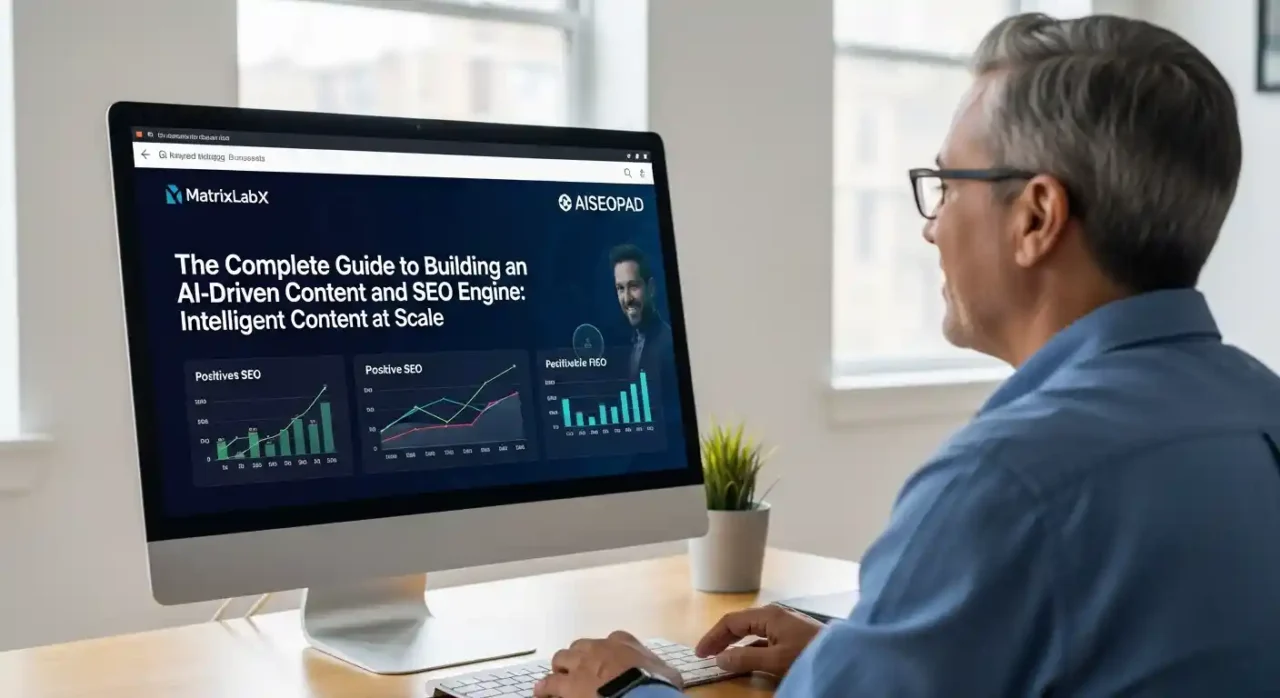The Complete Guide to Building an AI-Driven Content and SEO Engine
Learn About The Complete Guide to Building an AI-Driven Content and SEO Engine.
In the fast-paced world of digital marketing, staying ahead means more than just keeping up—it means leading the charge with innovation and precision.
Enter the Intelligent Content at Scale era, where AI transforms content creation and SEO from a scattergun approach into a strategic, orchestrated symphony. For B2B marketers, CMOs, and growth teams, this is not just evolution—it’s a revolution.
Imagine a marketing machine that never sleeps, tirelessly optimizing your strategies and amplifying your reach. This is the promise of an AI-driven content and SEO engine. It’s about transcending the chaos of random acts of content and stepping into a realm where every piece of content is purposeful, every SEO strategy is insightful, and every decision is data-driven.
AI isn’t here to replace marketers but to elevate them. By harnessing the power of artificial intelligence, marketing managers can unlock superhuman capabilities, allowing them to focus on creativity and strategy while AI handles the heavy lifting. This is your chance to become the maestro of a marketing orchestra, where AI plays the instruments that bring your vision to life.
This comprehensive guide will explore how to build an AI-driven engine that scales your content efforts with precision and impact. From understanding the foundational technologies to implementing advanced strategies, you’ll learn how to transform your marketing operations into an always-on powerhouse.
Get ready to dive deep into a world where intelligent content drives growth, engagement, and success.

So, are you ready to harness the power of AI and revolutionize your marketing strategy? Welcome to the future of content and SEO—welcome to Intelligent Content at Scale.
Two key statistics highlight artificial intelligence’s growing role in content creation and search engine optimization (SEO) in 2025.
These figures underscore the increasing reliance on AI to produce and manage digital content at scale, fundamentally altering online visibility and engagement strategies.
The first verifiable statistic is that by 2025, the AI content marketing industry will reach $17.6 billion, expanding at a compound annual growth rate (CAGR) of 25.68%.
This rapid growth indicates a substantial shift in how businesses allocate resources, with a clear trend towards leveraging AI for content generation, personalization, and strategy.
This data point, reported by sources such as MatrixLabX, points to the escalating investment in and adoption of AI technologies to meet the ever-increasing demand for high-quality, relevant online content.
A second critical statistic reveals that in 2025, 84% of marketers believe in using AI for SEO to align web content with user search intent.
This finding from AISEOPad.com highlights a strategic move beyond simple keyword optimization towards a more nuanced, user-centric approach powered by artificial intelligence.
Marketers increasingly turn to AI tools to analyze vast amounts of data, better understand what users seek, and tailor their content to meet those needs.
This demonstrates a maturation in the application of AI in SEO, focusing on the quality and relevance of content to improve search engine rankings and user experience.
Together, these statistics paint a clear picture of an industry amid a significant transformation.
Financial investment in AI-driven content solutions is surging, and the strategic application of AI to understand and cater to user intent has become a primary focus for most marketing professionals.
Is Your Marketing Stack Leaving Money on the Table?
Your disconnected tools see pieces of the puzzle. A unified AI platform sees the whole picture. Enter your metrics to quantify the impact of switching to MatrixLabX.
Your Current Metrics
Core Business Inputs
1. Searching
2. Streaming
3. Scrolling
4. Shopping
Your Performance Transformed
| Metric | Your Platform | MatrixLabX | Monthly Lift |
|---|
Total Estimated Annual Gain
$0
from improved conversions and recovered revenue
You’re Creating Content — But It’s Not Converting, Ranking, or Scaling
Marketing teams invest significant time and resources into content creation, yet they often face challenges with conversion, ranking, and scaling.
Despite crafting numerous blog posts, updating web pages, and chasing SEO trends, the absence of data-driven strategies and repeatable systems can lead to underwhelming results.
Content that lacks strategic insights and automation can stall growth and lead to burnout, as teams struggle to manage everything manually.
The key to overcoming these hurdles is to adopt a smarter content creation and distribution approach.
This involves leveraging data analytics to inform content strategy, ensuring that each piece of content is tailored to meet the needs of your audience while aligning with search engine algorithms.
Additionally, implementing scalable systems and automation can streamline processes, allowing teams to focus on high-impact activities rather than getting bogged down in routine tasks. 10 Most In-Demand Types of SEO Services to Focus On in 2025
Intelligent Content at Scale

For B2B marketers, CMOs, and growth teams, transitioning from sporadic content efforts to an orchestrated, always-on marketing machine is crucial. Intelligent content at scale is the solution that enables this transformation.
By integrating AI-powered tools, marketers can enhance their capabilities and deliver more personalized and effective content without sacrificing efficiency.
AI isn’t replacing marketers; it empowers them to become superhuman. For instance, AI can analyze vast amounts of data to identify content trends, predict audience behavior, and optimize content for SEO.
This allows marketing teams to create content that ranks higher in search results and resonates more deeply with their target audience, driving conversions.
Moreover, intelligent content systems facilitate scalability. By automating repetitive tasks such as content distribution and performance tracking, teams can focus on strategic planning and creative execution.
This ensures that content efforts are consistent and adaptable to changing market dynamics.
Integrating AI in content marketing offers a competitive edge for CMOs, CROs, RevOps leaders, and SaaS buyers evaluating platforms. It provides the insights and tools to enhance customer engagement, streamline operations, and drive revenue growth.
By embracing intelligent content at scale, organizations can transform their marketing efforts from random content creation into a cohesive, data-driven strategy that delivers measurable results.
In conclusion, the future of content marketing lies in harnessing AI and automation to create intelligent, scalable systems.
By doing so, marketing teams can overcome the challenges of conversion, ranking, and scaling, ensuring sustained growth and success in an increasingly competitive landscape.
Our Amazing Clients.
For nearly two decades, we have forged partnerships with companies that aspire to minimize waste, gain a competitive edge, and truly prioritize the well-being of their stakeholders.






Step-by-Step Guide to Building an AI-Driven Content and SEO Engine
Step 1: Define Objectives and KPIs
- Identify Goals: Establish objectives such as increasing organic traffic, improving conversion rates, or enhancing content engagement.
- Set KPIs: Determine key performance indicators, such as page views, time on page, bounce rate, and conversion rate.
Step 2: Conduct a Content Audit
- Analyze Existing Content: Use tools like SEMrush or Ahrefs to evaluate current content performance.
- Identify Gaps: Determine topics lacking coverage or underperforming in search rankings.
Step 3: Leverage AI for Content Strategy
- AI Tools Selection: Choose AI-driven platforms such as Clearscope, MarketMuse, or Frase to analyze search intent and keyword opportunities.
- Content Clustering: Use AI to group related topics and identify pillar content opportunities.
Step 4: Automate Content Creation
- AI Writing Assistants: Utilize tools like Jasper or Copy.ai to generate initial drafts, headlines, and meta descriptions.
- Content Personalization: Implement AI to tailor content based on audience segmentation and preferences.
Step 5: Optimize for SEO
- AI-Powered SEO Tools: Employ tools like Surfer SEO to optimize content structure, keyword density, and readability.
- Real-Time Feedback: Use AI to receive instant optimization suggestions during content creation.
Step 6: Implement a Content Distribution Strategy
- Automated Scheduling: Use platforms like Buffer or Hootsuite to post automated content across social media channels.
- Email Marketing Automation: Leverage tools like Mailchimp or HubSpot to automate personalized email campaigns.
Step 7: Monitor and Analyze Performance
- Data Analytics Tools: Use Google Analytics and AI-driven insights from platforms like HubSpot to track content performance.
- A/B Testing: Continuously test content variations to optimize engagement and conversion rates.
Step 8: Refine and Scale
- Feedback Loops: Use AI to gather audience feedback and adjust content strategy accordingly.
- Scalable Systems: Develop repeatable content creation and distribution processes to facilitate scaling.
Step 9: Continuous Learning and Adaptation
- Stay Updated: Regularly review AI and SEO trends to keep your strategy relevant.
- Iterate and Improve: Use insights from performance data to refine and enhance content strategy continually.
By following these steps, marketing teams can build an AI-driven content and SEO engine that enhances productivity, ensures content is engaging, ranks well, and drives conversions.
Case Studies: Transforming Content Strategy with AI-Driven Solutions

Case Study 1: Revamping Content Strategy for a Tech Startup
Challenge: A tech startup was producing a high volume but struggled with low conversion rates and poor search engine rankings. Despite their efforts, the content wasn’t reaching the right audience or generating leads.
Solution: The startup transformed its content strategy by implementing “The Complete Guide to Building an AI-Driven Content and SEO Engine. ” The AI system analyzed audience behavior, identified high-performing keywords, and automated content scheduling.
Results:
- Increased Conversion Rates: The AI-driven insights allowed the team to create content tailored to user intent, boosting conversion rates by 35%.
- Improved SEO Rankings: Automated keyword optimization and strategic content updates increased organic search traffic by 50%.
- Scalable Processes: Automation reduced manual workload, enabling the team to scale content production without burnout. Top 7 Challenges Facing SEO Managers in 2025
Case Study 2: Enhancing SEO for an E-commerce Platform
Challenge: An e-commerce platform faced stagnant growth due to ineffective SEO strategies. Despite frequent updates, their content failed to rank well or drive significant traffic.
Solution: The platform adopted the AI-driven content and SEO engine, which provided data-driven insights into competitor strategies and customer search patterns. The AI tool automated keyword research and content optimization.
Results:
- Higher Search Rankings: The AI-driven approach improved search engine rankings by 60% within six months.
- Traffic Growth: Organic traffic increased 45%, increasing engagement and sales.
- Efficient Resource Allocation: The automated system allowed the marketing team to focus on creative strategies, improving overall productivity.
Case Study 3: Streamlining Content Production for a Marketing Agency
Challenge: A marketing agency struggled with scaling content production while maintaining quality and consistency. Manual processes led to team burnout and inconsistent results.
Solution: The agency streamlined its content creation process by integrating AI-driven content with the SEO engine. The AI provided actionable insights, automated repetitive tasks, and ensured alignment with SEO best practices.
Results:
- Consistent Quality: The AI system maintained content quality by providing real-time feedback and optimization suggestions.
- Increased Efficiency: Content production time was reduced by 40%, allowing the agency to take on more clients.
- Sustainable Growth: The scalable solution enabled sustainable growth without overburdening the team.
These case studies illustrate how implementing an AI-driven content and SEO engine can solve common challenges in content marketing.
By leveraging automation and data-driven insights, businesses can enhance their content strategy, improve SEO performance, and achieve scalable growth.
FAQs: The Complete Guide to Building an AI-Driven Content and SEO Engine

1. What is an AI-driven content and SEO engine?
An AI-driven content and SEO engine is a system that leverages artificial intelligence to automate and optimize content creation and search engine optimization processes.
It uses data-driven insights to enhance content relevance, improve rankings, and increase conversion rates.
2. How does an AI-driven engine help with content conversion?
AI-driven engines analyze user behavior, preferences, and engagement metrics to tailor content that resonates with the target audience.
Aligning content with user intent enhances the likelihood of conversion.
3. Can AI improve content ranking on search engines?
AI can analyze search algorithms and trends to optimize content for better ranking. It helps identify keywords, suggest improvements, and ensure that content meets search engine guidelines, improving visibility.
4. What role does AI play in content scaling?
AI automates repetitive tasks and provides insights for content creation, allowing teams to produce more content efficiently. It helps maintain consistency and quality, enabling scalable growth without exhausting resources.
5. How does AI provide data-driven precision in content creation?
AI tools analyze vast amounts of data to uncover trends, audience preferences, and competitive insights. This precision allows marketers to craft content strategies informed by real-time data, enhancing effectiveness.
6. What are the key benefits of using AI in content and SEO strategies?
Key benefits include increased efficiency, improved content quality, enhanced SEO performance, better audience targeting, and the ability to scale operations. AI reduces manual workload and provides actionable insights.
7. How does an AI-driven engine prevent team burnout?
By automating tedious and time-consuming tasks, AI frees team members to focus on strategic and creative aspects of content marketing. This balance reduces stress and prevents burnout.
8. Is it difficult to integrate AI into existing content strategies?
Integration can vary in complexity depending on the current infrastructure. However, many AI solutions are designed to be user-friendly and can be integrated with existing tools to enhance capabilities without overhauling systems.
9. What challenges might arise when building an AI-driven content engine?
Challenges include data privacy concerns, the need for quality data inputs, and the potential for over-reliance on automation. It’s crucial to balance AI capabilities with human creativity and oversight.
10. How can marketing teams start building an AI-driven content and SEO engine?
Begin by identifying specific goals and challenges. Research AI tools that align with these needs, and gradually integrate them into workflows. Continuous learning and adaptation are essential to maximize benefits.
11. Are there any limitations to AI in content marketing?
While AI offers powerful tools, it lacks the human touch in creativity and emotional intelligence. It should complement, not replace, human input to ensure content remains engaging and authentic.
12. How do AI-driven engines handle SEO trends and updates?
AI systems continuously analyze search engine algorithms and market trends to adapt real-time strategies. This agility ensures content remains optimized for the latest SEO requirements.
By addressing these FAQs, marketing teams can better understand AI’s transformative potential in content and SEO strategies, helping to overcome common challenges and drive sustainable growth.




Conclusion
In today’s fast-paced digital landscape, marketing teams often find themselves trapped in a cycle of producing content that neither converts nor ranks effectively. This inefficiency stems from a lack of data-driven strategies and scalable systems, leading to burnout and stagnation.
However, introducing AI-driven content and SEO engines has revolutionized how businesses approach content creation, offering a solution that addresses these persistent challenges.
For CMOs, CROs, RevOps leaders, and SaaS buyers, the journey from chaotic content strategies to compounding growth begins with the realization that more effort isn’t the answer. Instead, smarter systems powered by artificial intelligence are key. By leveraging AI, teams can automate mundane tasks, gain actionable insights, and create content that ranks, converts, and scales efficiently.
Frustrating, inconsistent performance, and slow organic results are common narratives among marketing professionals. Traditional methods, reliant on manual effort and guesswork, often fail to deliver the desired outcomes.
However, by integrating AI into their content strategies, organizations can harness the power of data to drive precision and consistency. AI tools analyze vast amounts of data to identify trends, optimize keywords, and tailor content to meet audience needs, ensuring that each piece contributes to overarching business goals.
Moreover, an AI-driven content engine enables scalability. By automating repetitive tasks such as keyword research, content scheduling, and performance analysis, teams can focus on strategic initiatives that drive growth.
This shift enhances productivity and empowers marketing professionals to make informed decisions based on real-time data.
The transformation from chaos to compounding growth is marked by the ability to produce content that resonates with audiences and achieves high search rankings. AI tools provide insights into audience behavior, preferences, and engagement patterns, allowing for the creation of personalized and relevant content. This relevance is crucial in converting visitors into loyal customers, ultimately driving revenue and business success.
In conclusion, adopting an AI-driven content and SEO engine is a game-changer for organizations seeking to overcome the challenges of non-converting and non-ranking content.
By embracing these advanced technologies, marketing teams can transition from labor-intensive processes to efficient, data-driven strategies that deliver measurable results.
The journey to compounding growth is not about working harder but working smarter, leveraging AI to build a self-sustaining engine that propels businesses forward in the competitive digital landscape.

